For years, we've been calling Global Entry the ultimate tool for international travelers. It's a two-for-one, as it gets you into a shorter (and speedier) immigration line when returning to the U.S. … but also includes TSA PreCheck benefits for a quicker trip through airport security, too.
But it's actually a triple threat now. Forget a trip to the DMV to get a new ID or bringing your passport: With Real ID requirements now in effect, you can just keep your Global Entry card in your wallet to keep flying hassle-free – it's one of the federally approved alternatives.
At $120 for a five-year membership, it's some of the best money international travelers can spend – plus, with one of the many credit cards that cover that entire cost, you can easily make it free! But between a backlog in processing applications and struggling to find an in-person appointment to wrap up your registration, the enrollment process for Global Entry can be time-consuming.
It doesn't have to be. Here's our guide on how to get it done quickly.
How Global Entry Works
Global Entry is one of two popular “Trusted Traveler Programs” run by the U.S. government, and it’s the best way to clear immigration quickly after your international flight back to enter the United States. And when we say quickly, we mean quickly.
After a recent trip to Southeast Asia, I landed in Chicago-O'Hare (ORD) to find a massive line for customs and immigration – it would have taken at least an hour, maybe more. But Global Entry gets you access to a dedicated line … and that was completely empty. After snapping a quick selfie at one of the Global Entry kiosk (or via the Global Entry smartphone app), I walked over to an immigration agent, gave him my name, and walked through. The entire process took less than two minutes – I barely stopped walking!
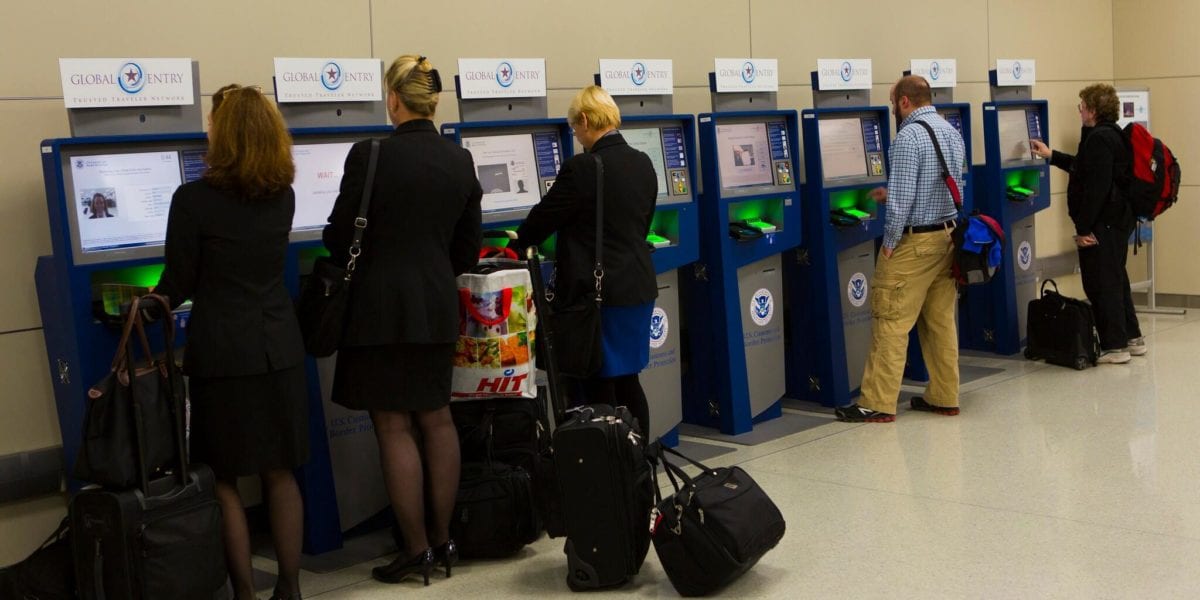
The federal government has been rolling out new “Seamless Border Entry” technology so you can just walk past a kiosk and continue on your way.
The other Trusted Traveler Program is TSA PreCheck, which you can use to skip long lines at airport security before getting on your flight whether you are traveling domestically or internationally.
But part of the reason why Global Entry is so popular – and powerful – is that it also comes with TSA PreCheck. That means you can skip long lines at security on your way into the airport and as you come back into the country through immigration. So if you travel internationally just once a year, that makes Global Entry the easy choice over PreCheck.
Both programs have a five-year membership once you’re enrolled. After an increase, Global Entry now costs $120, while PreCheck now costs $78 after a price drop. And as you’ll see below, more and more credit cards offer credits to cover the enrollment cost.
How Much it Costs (& How to Get it Free)
Global Entry itself costs $120 for a five-year membership. That's a small price to pay for five years of speedier travel.
However, plenty of credit cards include a credit that covers the entire cost of Global Entry or TSA PreCheck enrollment as a perk. It seems like a new card adds this feature every year.
Many top-tier cards like *amex platinum card*, the *chase sapphire reserve*, and the *venture x* offer this benefit. But then there are even cheaper options that allow you to cover the cost of Global Entry, like the *capital one venture card*.

Read our guide on the top cards that offer Global Entry or TSA PreCheck.
All you need to do to cash in on that credit is pay with the card that covers your application fee. That means you can pay for a friend or family member to apply if you are already enrolled. Just use your card with a credit and you're set.
Finally, there's a major upside for traveling families.
Children under 18 can now join Global Entry free if their parent or guardian has Global Entry – a major change, considering minors (even newborns!) previously had to pay for their own enrollment. Minors still have to apply and be approved separately for Global Entry in order to do so, but it's free so long as their parent or guardian is already part of Global Entry (or applies at the same time).
Starting Your Application
Before you pay for your enrollment, you first need to apply for Global Entry. Luckily, it’s fairly straightforward.
So long as you’re a legal U.S. resident (or a citizen of a handful of other countries including Argentina, South Korea, Singapore and more) without a criminal record or previous immigration issues, you’ll most likely meet the requirements.
The application is filled with personal details to prove your identity and verify your previous travels. They’re fairly typical questions, though one potential hiccup is that you’ll need to provide five years of employment history and residential addresses. Depending on how much you’ve moved around, it could be a challenge.
You'll also need to provide some details on your international travel history over the last five years, too – including the months and years of your trips. Make sure you've got that all down by cross-checking old confirmation emails from airlines or scrolling through photos. Better yet, if you use an app like TripIt or Flighty, just pull up your past travels to easily document your history.
The whole application takes about 10 minutes. From there, it's a waiting game as Customs and Border Protection (CBP) runs your background check and processes your application. Watch your email inbox for an alert about a change in your Global Entry application status.
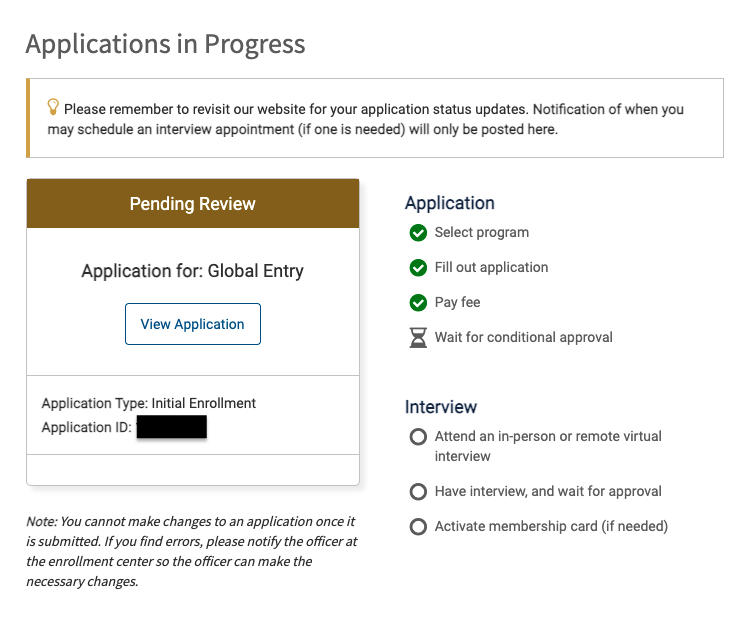
Read more: What to Do When You're Waiting on Global Entry Enrollment
Sure enough, I received an email about four business days later notifying me of a change. After logging in to my trusted traveler account, I saw that I had indeed been conditionally approved for the program in under a week. In some cases, it can be even faster. Unfortunately, other applicants wind up waiting in limbo for months – especially lately.
With demand for this must-have international travel program surging, many travelers have reported waiting for months on end for conditional approval. It's gotten so bad that the federal government began urging travelers to pick TSA PreCheck over Global Entry last summer.
While federal officials say some travelers can complete the entire process in less than 30 days (and that was our experience recently), backlogs in processing applications can drag out the process for months. U.S. Customs and Border Protection said last year that the average processing time for new Global Entry applicants, start to finish, was 208 days.
Still waiting on Global Entry conditional approval? Try calling the Global Entry information line at (877) 227-5511 to escalate your approval process, but there's no guarantee. And reports from travelers suggest that CBP will not escalate a Global Entry application until the nine-month mark.
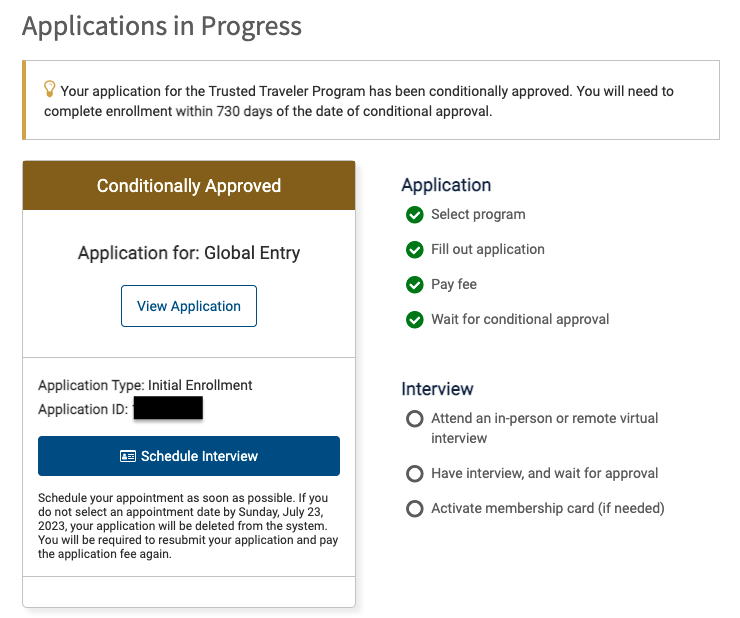
After receiving conditional approval, the next step is scheduling an interview to finalize your enrollment. And that can be the most difficult part of the entire process.
Scheduling Your Global Entry Interview
To wrap up your enrollment, you'll need to schedule an in-person interview. And depending on where you live and how many enrollment centers are around, this can be the most cumbersome part of the process. Regardless, it takes some effort and patience.
Schedules for these interviews are changing constantly, as Customs and Border Protection officials add availability in blocks and fellow travelers book or cancel their existing appointments. So even if the next appointment isn't for many months when you first look, secure the earliest appointment and then check back on the scheduling platform a few times a day to try to move it up sooner.
You can check out the interview schedules at enrollment centers nationwide here.
Check out our tips to securing a Global Entry interview faster!
Thrifty Tip: Check for interview availability on the first Monday of the month at 9 a.m. local time – that's when federal officials add new slots at many major enrollment centers.
That's what makes services like Appointment Scanner invaluable. This service scrapes the entire interview schedule 24/7/365, alerting you whenever it finds an appointment at your designated enrollment centers. You can get alerts for up to three locations by email or text, then head out and snag an opening as soon as you get one. It costs $29 for one month of alerts, which could be easily worth it. Another service, Global Entry Spotter, is worth checking out as well.
But Customs and Border Protection also offers a much easier and faster way way to finish up your Global Entry registration: Enrollment on Arrival.

If you’ve been conditionally approved, you can do the interview and finalize your enrollment after exiting the plane and before clearing customs at 60-plus airports nationwide and over a dozen international locations with customs pre-clearance. You must be entering the U.S. after disembarking from an international flight.
The only hitch is that you won't be able to use Global Entry – or TSA PreCheck, either – until you complete that interview upon re-entering the U.S. But it could be the easiest and fastest way to wrap up your enrollment.
What to Bring to Your Interview
Once you've scheduled an interview, the hard part is over. But this is the last and most important step in signing up.
To prepare for your Global Entry interview, be sure to gather your passport, driver’s license, and confirmation of your conditional approval before you head to the enrollment center on the day of your interview. If the address on your driver’s license doesn’t match your current home address, you may want to bring another ID or piece of mail, as well.
Common Interview Questions
The interview itself is quite simple: I was in and out within 10 minutes after being asked only to confirm my recent travels, some personal details and why I wanted to be in the program. Others might take longer, as it surely varies by an agent.
After the brief interview, the officer snapped a quick photo and took my fingerprint scans. That was really all it entailed. In just a few minutes he told me I had been approved and would receive an email notification. Sure enough, I had an email within minutes letting me know my account status had been updated.
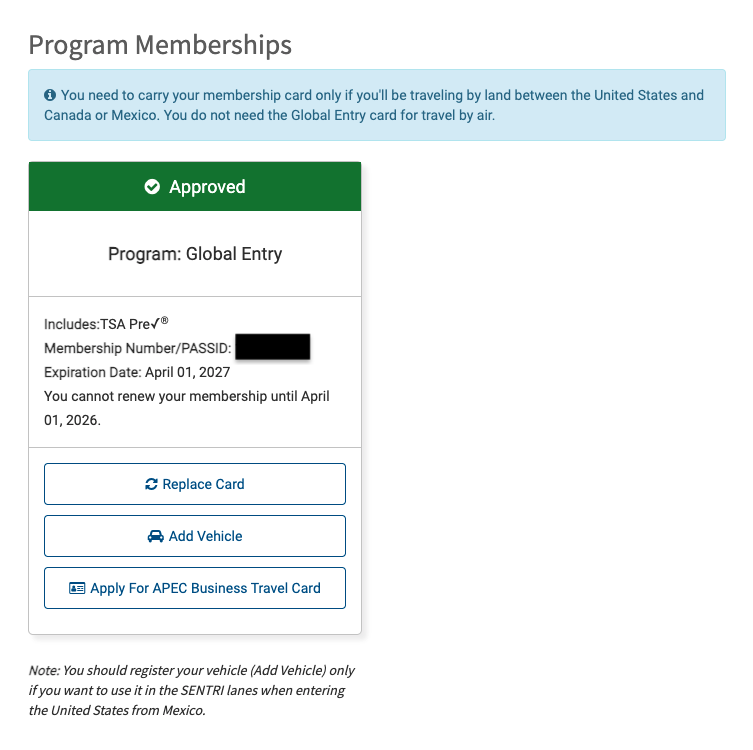
You should also get a membership card within a few days or a week by mail.
Using Global Entry
Once you've received your membership card, follow the attached instructions to activate it.
But unless you’re entering the U.S. from Canada by land – or using it as a Real ID alternative at airport security – there’s not much reason to carry around the card. You only need your passport, really … and in many cases, you won't even need that in hand in order to clear immigration.

Once you land, follow the signs toward customs and immigration and the designated Global Entry lines. They're almost always drastically shorter (and much faster) than the standard immigration line for returning U.S. citizens. You'll see a row of kiosks: the key to speeding through immigration.
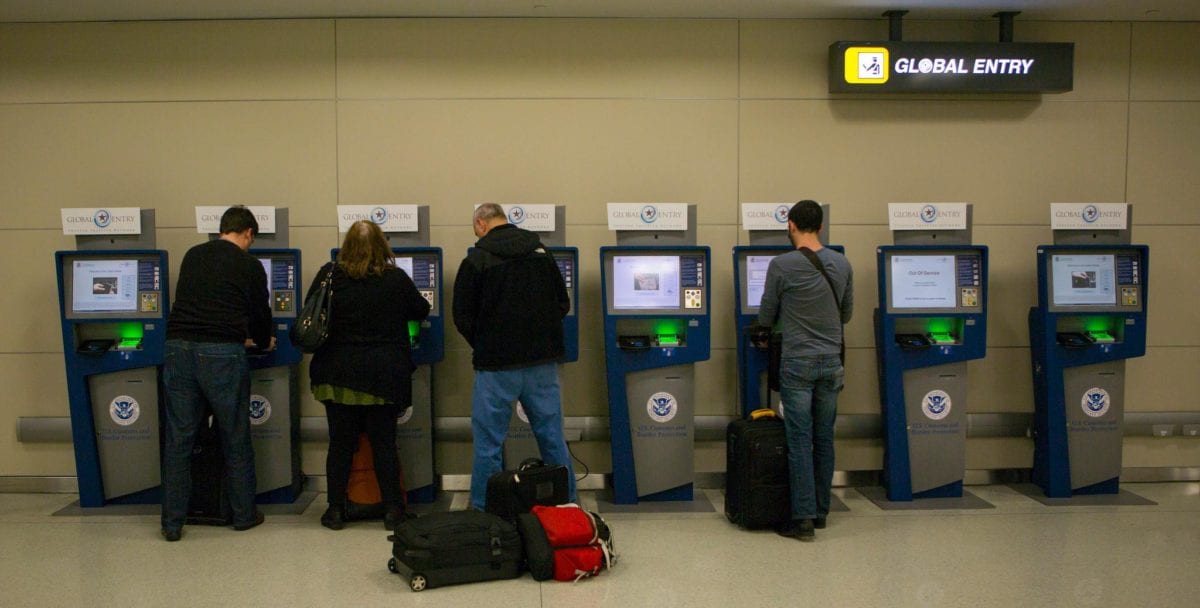
Exactly what you need to do once you reach a kiosk varies.
- Some may require you to scan your passport and fingerprints, though those are few and far between these days
- Some will simply have you snap a quick photo and answer a few brief questions about your trip on the screen before printing out a slip to hand off to an immigration officer
- Most of the newest Global Entry kiosks will automatically take a photo as you stand by, then direct you to proceed to an immigration agent
The whole process of clearing immigration shouldn’t take more than a few minutes. Compared to the backed-up lines you might be used to, it’s a breeze.
And it's getting even easier. The federal government recently launched a new Global Entry Mobile app, allowing enrolled members to simply snap a selfie on their phone, process their arrival, show an immigration officer their digital receipt, and walk on through. It's now available at most major U.S. airports.
Getting PreCheck Set Up
As for utilizing your new TSA PreCheck benefit, keep in mind that PreCheck doesn’t work on its own. The airline you’re flying must participate in order for you to skip the lines and get in a PreCheck lane. Fortunately, almost every major airline participates in PreCheck now.
That means you need to enter your Known Traveler Number (KTN) in your airline account. Simply grab your Global Entry Membership Number (or PASSID), and enter it as a KTN. This should be available as soon as your account is approved following your interview.
If you upgrade from PreCheck to Global Entry, or vice versa, your KTN will not change.
Once you’ve updated your account with a TSA PreCheck-participating airline, your PreCheck benefit should carry over. Check with the TSA to see if your airline works with PreCheck. Good news: Almost all the big ones (and increasingly even minor carriers) do.
Tips to Get Your Global Entry Approved Faster
Here are a few tips for getting your Global Entry approved quickly in 2025.
- Already got TSA PreCheck? While you won't get a discount when applying for Global Entry, we've seen plenty of anecdotal reports that suggest having gone through the TSA PreCheck background check process will expedite your approval process.
- Be an interview appointment hawk. If your nearest enrollment center says there aren't available appointments until later in the year, don't just take their word for it! Book the next available appointment, whenever that is, as soon as you can, but then check the appointment schedule calendar early every morning to see if cancellations or a new batch of appointments open an earlier window. Or try a service like Appointment Scanner to do that work for you.
- Use Enrollment on Arrival. If you are traveling abroad soon, use the EoA program to get an interview without an appointment. As soon as you land, you can interview with a CBP agent that day at the airport. Just make sure you allow for the extra time the interview will take and if you have to wait for others in front of you.
- Be prepared. According to a CBP spokesperson, the most important thing for interviewees is to come prepared. If you don't bring all of your documents and information with you, you will have to make a new appointment and come back later. That misstep could cost you months. At minimum, you'll need to bring a valid passport, another form of ID like a driver's license.
Bottom Line
Global Entry is more powerful than ever.
With long lines at airport security and customs and immigration, Global Entry can get you through both in no time. And now the ID card will work for Real ID purposes.
While getting signed up isn't always a cinch, it's well worth it. And if you’ve got one of the credit cards that covers Global Entry enrollment, it's an absolute no brainer.

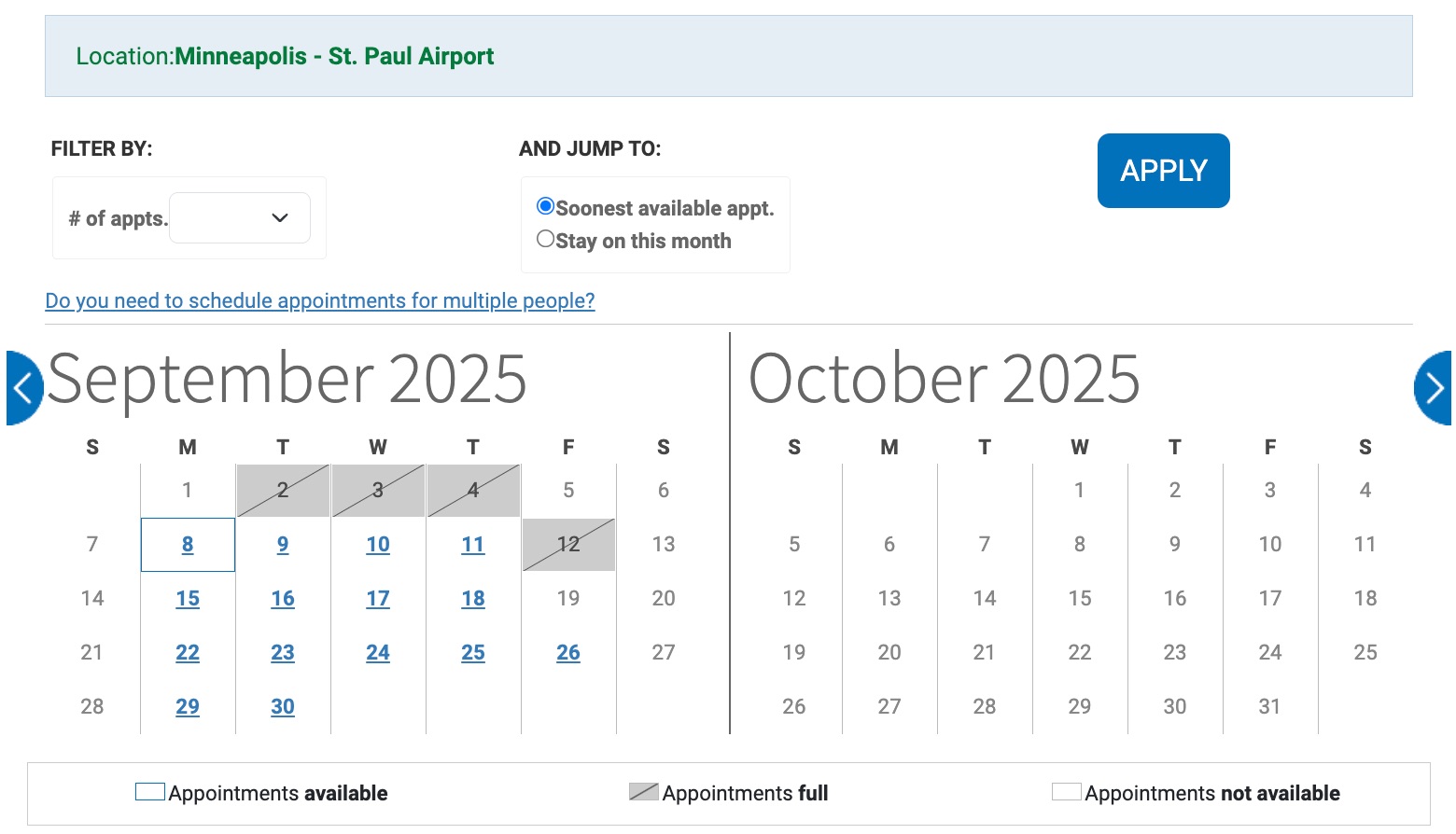
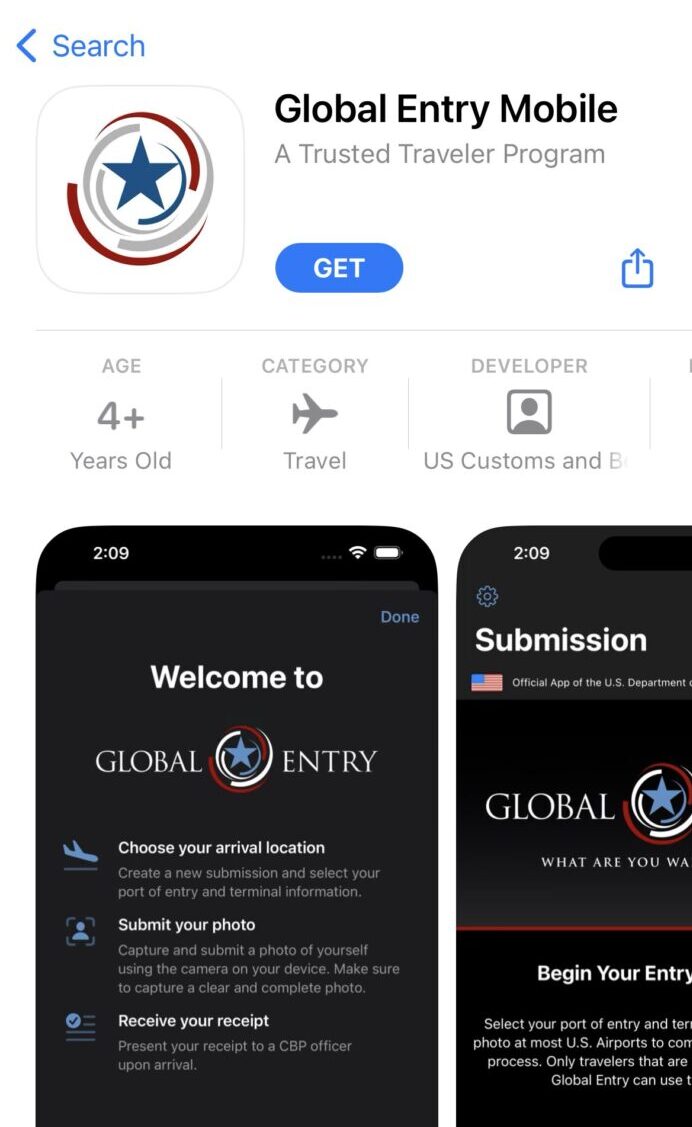


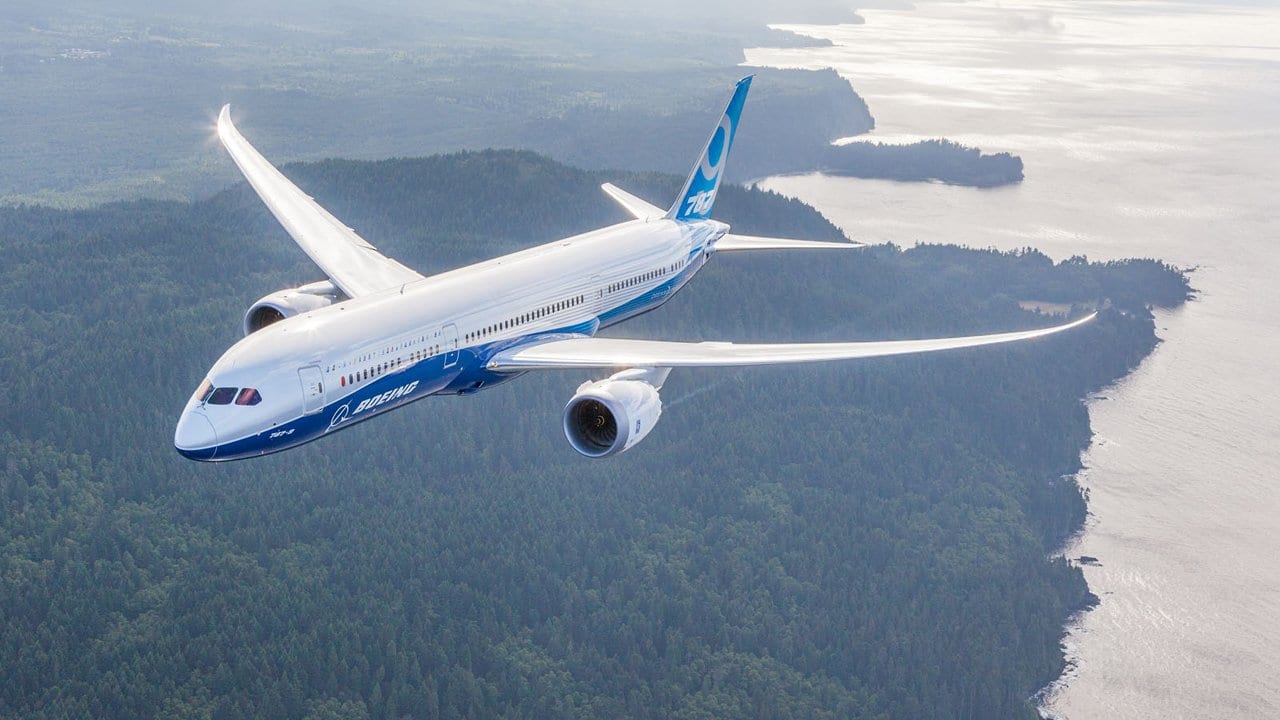
Global Entry is fantastic. I had it in 2019 during a government shut down on my return from Mexico. The lines at customs and immigration were hundreds and hundreds deep – could have been over a thousand. I walked right by them.
Also, renewal is a breeze. No need to re-interview. Got mine renewed and covered by AmEx within a few weeks of applying.
I have my Global Entry membership, number and password, but I have lost the card. How do I get a new one as efficiently possible?
Bots get all of the appointments and then charge up to $30 for services that claim to help get appointment. Also, I have been trying when I reenter but the interview stations are closed without warning and they don’t even put up a sign to say when they will reopen. It’s starting to feel like a huge scam.
How I apply for my 3 yo for global entry, obviously she don’t have a 5 years address or employment ?
Minor correction…if you have TSA pre and then get GE…your KTN DOES change. Or it will.
The KTN wth TSA is a TT#. The KTN for GE has no letters…only 9 numbers…the PASSID on the back of the card in the upper LEFT hand side. They do the same thing in the same spot (KTN) .
You can use your TSA TT# until it expires or change it over to the PASSID any time after approval in GE.
This is information from a CBP Officer that does GE on a regular basis.
How do I renew my global entry card?
Check out our guide https://thriftytraveler.com/guides/global-entry-renewal/
Go to the official website. There are many FAQs there.
Look under ALL FAQs at the MEMBERSHIP section.
About 7 items from the bottom is the one you need. Has step by step instructions.
You can do this up to 1 YEAR before the card expires.
My passport expired and I am waiting for the new passport to be processed. Can I get my Global Entry renewed without a new passport?
I don’t have the old passport as that was sent in with the renewal passport application
Some offices may do a renewal without a passport. The renewal application may not ask for the passport as a required field, so they might be able to complete the interview without it.
You may want to call the enrollment center you will be using and ask them…just to be sure.
Hmm what about people who are in the “safe at home program” (address protection) throught the secretary of state I was told no real ID use passport but what about gobal ID would this this be something we can get and being in that program a conditional reason and how can we ask question before applying so we don’t lose money on this and we might not be able to receive this ID at all.
My husband applied months ago, have conditional approval and have not been able to schedule an interview. We were notified about completing it at the end of an international trip and had a five hour layover and thought we would try to complete it. The customs agent told us that it would be risky with only five hours to try. This was in Chicago. We left feeling that we would need to spend the night rather than risk missing our connecting flight. Disappointing at best.
My passport expired and I am waiting for the new passport to be processed. Can I get my Global Entry renewed without a new passport?
I don’t have the old passport as that was sent in with the renewal passport application
I just signed up for CLEAR but have not been to the Airport to complete the process. I have TSA Pre Check (I paid for both before knowing I did not need both). If I apply for a Chase Reserve now, can I get reimbursed even though I signed up for the CLEAR and TSA Pre Check BEFORE applying for the card? Also, I have Chase Preferred. Will my current points be transferred to Reserve? And is Global Entry the same as “CLEAR?”
Hey Laura. CLEAR is a charge that is not covered by any credit cards. If you travel frequently then I’d recommend having both CLEAR and TSA Precheck/Global Entry. If you already paid for the TSA Precheck then you can’t be reimbursed. Take another read through the post about for more info about Global Entry. Here is our best summary of CLEAR: https://thriftytraveler.com/clear-phoenix-international-airport/
Clear is covered by the AmEx Platinum.
NO…CLEAR has nothing whatsoever to do with GE.
CLEAR works in conjunction with TSA Pre-Check, though. CLEAR gets you to the front of the line at participating airports…then TSA Pre takes over…letting you keep your belt,shoes and jacket on, etc .